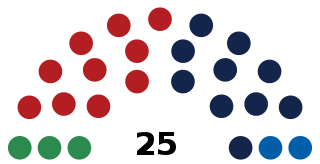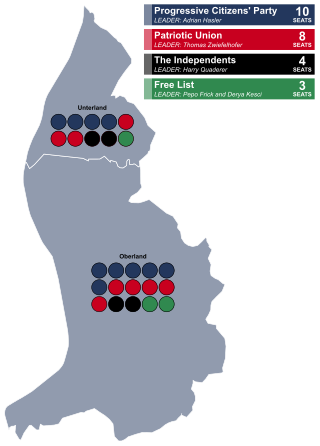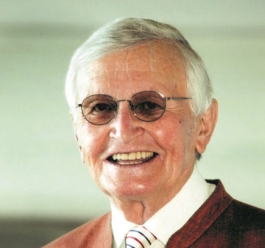
Liechtenstein is a principality governed under a semi-constitutional monarchy. It has a form of mixed constitution in which political power is shared by the monarch and a democratically elected parliament. There is a two-party system and a form of representative democracy in which the prime minister and head of government is responsible to parliament. However, the Prince of Liechtenstein is head of state and exercises considerable political powers.

Political identity came to the territory now occupied by the Principality of Liechtenstein in 814, with the formation of the subcountry of Lower Rhætia. Liechtenstein's borders have remained unchanged since 1434, when the Rhine established the border between the Holy Roman Empire and the Swiss cantons.
Women's suffrage is the right of women to vote in elections. Several instances occurred in recent centuries where women were selectively given, then stripped of, the right to vote. In Sweden, conditional women's suffrage was in effect during the Age of Liberty (1718–1772), as well as in Revolutionary and early-independence New Jersey (1776–1807) in the US.

The Progressive Citizens' Party in Liechtenstein is a conservative political party in Liechtenstein. The FBP is one of the two major political parties in Liechtenstein, along with the liberal-conservative Patriotic Union. Founded in 1918 along with the now-defunct Christian-Social People's Party, it is the oldest extant party in Liechtenstein.

Elections in Liechtenstein take place at a national level within a multi-party system, with two dominant political parties. The Landtag of Liechtenstein has 25 members, elected for a four-year term by proportional representation in two multi-seat constituencies.
Same-sex marriage will soon be legal in Liechtenstein. In November 2022, the Landtag passed a motion calling on the government to introduce a bill legalizing same-sex marriage, with broad support from across the political spectrum. A bill legalizing same-sex marriage was introduced in February 2024 and passed its final reading in the Landtag on 16 May 2024 by a 24–1 vote. It received royal assent from Prince Alois on 9 July 2024, and is scheduled to enter into force on 1 January 2025. Polling suggests that a majority of Liechtensteiners support the legal recognition of same-sex marriage.

The Landtag of the Principality of Liechtenstein, commonly referred to as the Landtag of Liechtenstein, is the unicameral parliament of Liechtenstein.

General elections were held in Liechtenstein on 31 January and 2 February 1986. The result was a victory for the Patriotic Union, which won 8 of the 15 seats in the Landtag. The Progressive Citizens' Party won seven seats, whilst the new Free List was less than 1% short of the 8% electoral threshold and failed to win a seat. The coalition government of the FBP and the VU continued.

A referendum on the introduction of women's suffrage was held in Liechtenstein on 28 February 1971. Voting was restricted to men, and resulted in a majority against its introduction. Voter turnout was 85.6%. Following the referendum, some women demonstrated in Vaduz and other towns, booing male pedestrians and carrying signs bearing the slogan "Men of Liechtenstein: Where's your virility".

General elections were held in Liechtenstein on 4 April 1939. Although a new system of proportional representation had been introduced to pacify voters at a time when the country was under threat from neighbouring Nazi Germany, it was not used and the elections became known as the "silent elections" as no actual vote was held. Instead, the governing Progressive Citizens' Party and opposition Patriotic Union formed a coalition, assigning a roughly equal number of seats each, in order to prevent the German National Movement in Liechtenstein from acquiring any seats in the Landtag.

Three referendums were held in Liechtenstein during 2011. The first on approving the registered partnership law was held between 17 and 19 June, and was approved by 68.8% of voters. The law went into effect on 1 September. The second was held on 18 September on allowing abortion within the first twelve weeks of pregnancy. Prince Alois had threatened to veto the result of the referendum should it have turned out in favour, but ultimately it was rejected by voters. The third was on building a new national hospital in Vaduz was held on 30 October, and was also rejected.

General elections were held in Liechtenstein on 3 February 2013, using a proportional representation system. Four parties contested the elections; the centre to centre-right Patriotic Union (VU), centre-right Progressive Citizens' Party (FBP), centre-left Free List (FL) and newly created right-wing populist alliance The Independents (DU).

General elections were held in Liechtenstein on 7 February 2021 to elect the 25 members of the Landtag. The Patriotic Union (VU) and Progressive Citizens' Party (FBP) both won ten seats, with the VU receiving just 42 votes more than the FBP. The Independents (DU), which finished third in the 2017 elections but then suffered a split in 2018 when three of its five MPs broke away to form Democrats for Liechtenstein (DpL), failed to win a seat, while DpL won two. The Free List retained its three seats, becoming the third-largest party in the Landtag.
Women's suffrage in Liechtenstein was introduced on 1 July 1984, after the 1984 Liechtenstein women's suffrage referendum. This was the last nation in Europe to introduce this right.
Bettina Petzold-Mähr is a former volleyball player and politician who has served in the Landtag of Liechtenstein since 2019.

General elections are scheduled to be held in Liechtenstein on 9 February 2025 to elect the 25 members of the Landtag. They will be the 49th general elections since the ratification of the 1862 constitution.

Hilmar Ospelt was a political figure from Liechtenstein who served as the Deputy Prime Minister of Liechtenstein from 1980 to 1986. He previously served as mayor of Vaduz from 1972 to 1980.

The Alfred Hilbe cabinet was the governing body of Liechtenstein from 18 March 1970 to 27 March 1974. It was appointed by Franz Joseph II and chaired by Alfred Hilbe.
Women in the Progressive Citizens' Party, often shortened to Women in the FBP, is a section of the Progressive Citizens' Party that officially represents the women's wing of the party. It is a grassroots group which provides campaigning, training and support for women within the party, and also general women-specific issues and equal rights.
Thomas Büchel is a politician from Liechtenstein who served as the Deputy Prime Minister of Liechtenstein from 1993 to 1997, under the government of Mario Frick. He previously served in the Landtag of Liechtenstein in 1993.










